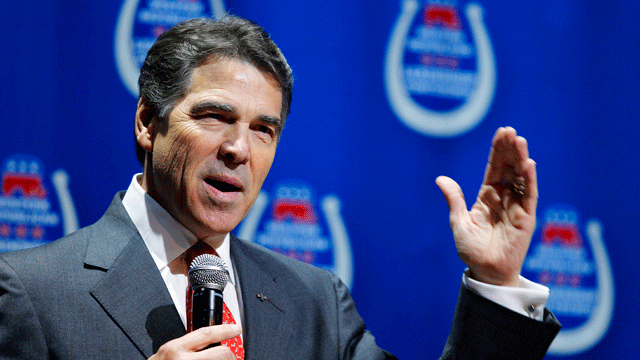
Republican presidential candidate, Texas Gov. Rick Perry delivers a keynote address during the Western Republican Leadership Conference, Wednesday, Oct. 19, 2011, in Las Vegas.
Seeking to reinvigorate his Republican presidential campaign, Texas Gov. Rick Perry will unveil next week his plan to simplify the federal tax code with a flat income tax rate – a proposal that has energized conservatives in the past but failed to gain mainstream support.
Perry, who entered the presidential race to great fanfare in August but stumbled in his first few debates, is hoping his plan will help recapture the early momentum of his campaign much in the same way that Herman Cain’s 9-9-9 plan helped vault him to the front of the GOP field. But Cain’s plan has come under intense scrutiny and criticism ever since, forcing the former pizza company executive to redefine the plan to make it fairer for the poor.
Perry campaign aides have offered no details of his plan yet but Perry said this week his plan will be "flatter and fairer" than Cain's.
“I want to the make the tax code so simple that even Timothy Geithner can file his taxes on time,” he quipped, poking fun at the treasury secretary’s late payment of $34,000 in payroll taxes last decade.
Perry is borrowing a page from the playbook of Steve Forbes, a longtime flat-tax advocate who is advising the campaign.
“The nightmare on Main Street is about to end,” said Forbes, a wealthy businessman who sought the GOP presidential nomination in 1996 and 2000.
Perry’s plan “will rip out this 10 million-word monstrosity," Forbes told Fox News, referring to the current tax code. Forbes said Perry's plan will "lower the price of good things like risk taking, success and productive work.”
“It’s going to get rid of a lot corruption in Washington,” he continued. “Half the lobbying revolves around the tax code. And it’s going to give more time to the American people. Last year, we spent 6.5 billion hours filling out tax forms, the equivalent of 3 million full-time jobs.”
“Liberation is at hand,” he added. “Yay.”
Sarah Palin also endorsed the plan too, telling Fox News it’s “going to gain momentum.”
“I look forward to hearing more of the details,” she said.
But liberal groups quickly criticized Perry's idea, saying it would raise taxes on lower- and middle-income Americans while giving breaks to the wealthiest.
The flat tax has an uneasy history in U.S. politics. Numerous Republicans and some Democrats hail its simplicity. But they have never managed to win enough support to enact it.
While many variations exist, the main idea is to replace the current stair-step range of income tax rates with one rate, paid by everyone. Advocates typically call for eliminating some or all of the existing tax deductions, such as those allowed for mortgage interest payments, gifts to charity and some medical costs.
Forbes said Perry's plan will differ from Herman Cain's so-called 9-9-9 plan because it will not call for a national sales tax. Cain, whose presidential bid has prospered lately, wants a 9 percent flat tax on personal and corporate income, as well as a 9 percent national sales tax.
Criticisms of a flat tax focus on its full or partial elimination of the progressive nature of the current tax code. In a progressive system, higher earners pay higher tax rates on their income.
Under a pure flat tax, with no exemptions or deductions, someone who earns $200,000 a year would pay exactly 10 times the amount of tax paid by someone who earns $20,000 a year. All income would be subject to one flat rate.
Under a progressive system, even if there were no exemptions or deductions to help poorer people, the $200,000 earner would pay more than 10 times the amount of tax paid by the $20,000 earner. That's because he pays higher rates on the upper portions of his income.
Supporters of progressive income tax systems say the feature is important to social fairness because other taxes tend to be regressive. For instance, a 5 percent state sales tax hits lower-income people proportionately harder than high earners because they must spend a larger portion of their income on necessities. That leaves them less able to save, invest or otherwise protect their income from the sales tax.
Payroll taxes, gasoline levies and other taxes also tend to be regressive because they essentially are flat.
A flat income tax "is inherently a shift of taxes off the wealthy and onto the middle class," said Michael Ettlinger of the Democratic-leaning Center for American Progress. When prominent politicians propose a flat tax, "there's often an initial episode of popularity," he said. "But then people understand the shift from the wealthy to the middle class," and support wanes, he said.
Forbes proposed a 17 percent flat rate in his presidential campaigns, which gained modest traction. He finished fourth in the 1996 Iowa caucus and New Hampshire primary. In 2000 he finished second in Iowa, 11 percentage points behind George W. Bush. He finished a distant third in New Hampshire.
The Associated Press contributed to this report.




